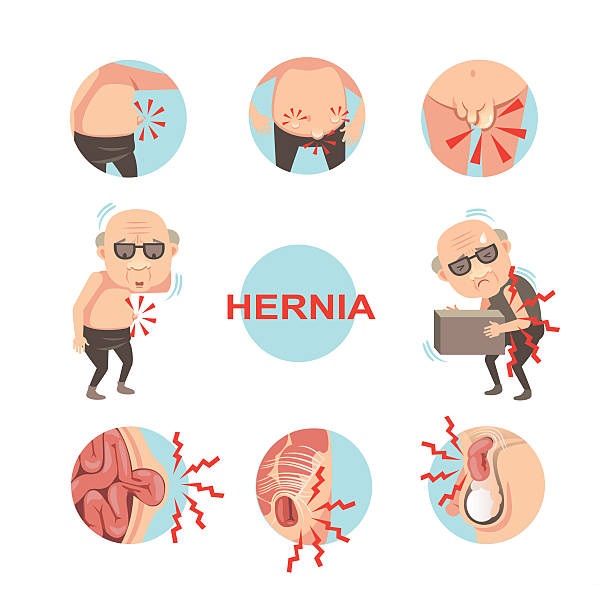When a person gets diagnosed with hernia, then the most common questions that come to mind are; What is hernia? What are its types? What are the symptoms and causes? In this article, let us discuss all these questions and their answers.
What is Hernia?
A hernia occurs when an internal organ or other body part pushes through a weak wall of the muscle or tissue that holds it in place. Most hernias occur within the abdominal cavity, between the chest and the hips, but they can also appear in the groin and upper thigh areas. Most hernias are not life-threatening. However, they should not be life untreated because they could cause complications. Usually, surgery is required to put the tissue back into its place.
What are The
Types of Hernia?
There are several types of hernia. Let us discuss the most common types of hernia below;
Inguinal Hernia: These are the most kind of hernia. The intestine or the bladder pushes through the abdominal wall or into the inguinal canal in the groin. It affects men more than women because of a natural weakness in this area.
Umbilical Hernia: These occur when part of the small intestine bulges through the abdominal wall near the belly button. It is found commonly in newborns and infants. Also, it is the only type of hernia that goes away on its own. Additionally, it can also affect women with obesity or during pregnancy.
Hiatal Hernia: A Hiatal hernia occurs when a portion of your stomach protrudes into your chest cavity through the diaphragm. The diaphragm is a muscular sheet that contracts and draws air into the lungs to help you breathe. It divides your abdominal organs from your chest organs. People over the age of 50 are more likely to develop Hiatal hernia.
Ventral Hernia: A ventral hernia occurs when tissue bulges through an opening in your abdominal muscles. When you lie down, you may find that your ventral hernia shrinks. Obesity, pregnancy, and intense activity are the common causes of ventral hernia.
What are The Causes of Hernia?
Pressure and an opening or weakening of muscle or fascia are the causes of all hernias. An organ or tissue is pushed through an opening or weak spot by pressure. Muscle weakness can be present before birth, but it is more common later in life. A hernia can be caused by anything that creates an increase in abdominal pressure, such as:
- Damage from an injury or surgery
- Pregnancy
- Intense exercise or lifting heavyweight
- Obesity
- Continuous coughing or sneezing
What are The Symptoms of Hernia?
A hernia in the belly or groin can cause a lump or bulge in the abdomen or groin that can be pushed back in or disappear while lying down.
After the lump has been pushed in, laughing, sobbing, coughing, straining during a bowel movement or physical activity may cause it to reappear.
Other symptoms of a hernia include:
- A bulge or swelling in the groin and scrotum
- Increased pain in the area of the bulge.
- Pain while lifting.
- Increase in the bulge size over time.
- A dull aching sensation.
- Signs of bowel obstruction or a feeling of being full
There are no bulges on the outside of the body with Hiatal hernias.
Instead, heartburn, indigestion, difficulty swallowing, frequent regurgitation (food coming back up) and chest pain are some of the common symptoms.


One Comment
Pingback: What is Hernia? – Sujata Birla Hospital